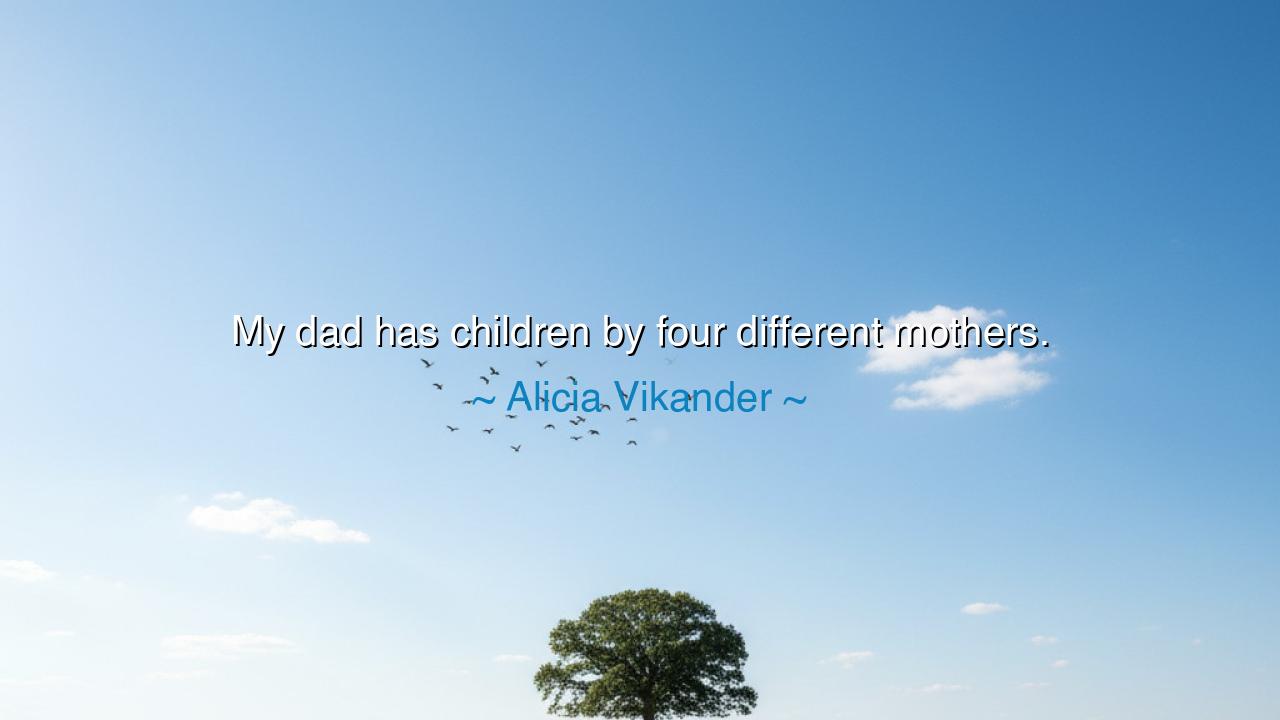
My dad has children by four different mothers.






The words of Alicia Vikander — “My dad has children by four different mothers” — though spoken plainly, carry a deep and layered truth about family, identity, and the complexity of love. In her voice there is no bitterness, only the calm understanding of one who has learned to see beyond convention — to recognize that family is not always born from symmetry, but from connection. Her words remind us that the human heart, vast and imperfect, does not always build life in neat shapes, yet even in its unevenness there can exist a quiet harmony.
Vikander, a daughter of two worlds — her father, a psychiatrist, and her mother, an actress — grew up among fragmented branches of kinship, children from different mothers, different lives, yet tied together by one shared root. Her quote does not lament this complexity; instead, it accepts it as truth. It is the kind of truth the ancients themselves would have understood well — for in every age, the structure of family changes, but the essence of belonging endures. In her words is an acceptance born of wisdom: that love cannot be contained by bloodlines alone, and that the wholeness of a family lies not in its perfection, but in the sincerity of its bonds.
The origin of this reflection lies not in scandal or sorrow, but in acknowledgment — in the recognition that identity often forms in the spaces between what society calls “whole.” It recalls the ancient proverb, “The reed that bends in the wind does not break.” Vikander’s family story, like many modern ones, is such a reed — flexible, imperfect, yet enduring. Where others might see division, she found understanding; where others might find discomfort, she found balance. In this way, her words rise beyond her own life, becoming a mirror for countless others whose families do not fit the old molds, but who have learned that love and stability are not the same thing as simplicity.
History is full of those who, born of blended or fractured families, carried that understanding into greatness. Alexander Hamilton, one of America’s Founding Fathers, was born out of wedlock and abandoned by his father — yet he rose not in spite of his complex beginnings, but perhaps because of them. His early awareness of loss and distance gave him a fierce drive to build something lasting, to create unity where life had given him fragmentation. So too, Vikander’s calm acknowledgment of her family’s irregular design reflects a mature acceptance of life’s unevenness — the understanding that our origins, however complex, do not confine us.
There is, in her statement, also a quiet lesson about judgment. The ancients taught that harmony arises not from uniformity, but from balance — the interplay of many tones in one chord. In the same way, family, love, and identity are symphonies of difference. The father with many children by different mothers may not have built a traditional home, but he has, in his own way, built a human constellation — one of connection, difference, and shared lineage. To look upon that constellation without prejudice requires wisdom — the ability to see the truth beneath appearances, to understand that love is often scattered, yet still radiant.
In a broader sense, Vikander’s reflection challenges us to look at our own notions of belonging. We live in an age where families are born through divorce, remarriage, adoption, distance, and reunion — and yet the human need for love remains the same. Her quote calls us to accept the plurality of love, to see that the heart, like the universe, expands through chaos and creation alike. What matters is not the pattern of its branches, but the strength of its roots — the understanding, forgiveness, and connection that keep it alive.
Let this then be the lesson: do not measure the worth of family by its form, but by its sincerity. Whether your home is whole or scattered, whether your parents stood together or apart, let gratitude guide your heart. Learn, as Alicia Vikander teaches through her quiet acceptance, to see beauty in complexity and to honor every bond that shapes you. For no life is without fracture, and no family without imperfection — but from the mosaic of all our broken pieces, love can still build something whole.






AAdministratorAdministrator
Welcome, honored guests. Please leave a comment, we will respond soon